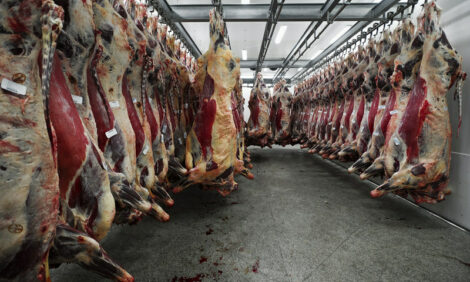



USDA Awards Funding For Research into Climate on Cattle
US - Beef and dairy industry understanding of climate change and weather variability on cattle is to receive a boost in the form of $19.5 million for investment in education, extension and research.The investment, from the US Department of Agriculture, comes as part of its mission on climate change. Despite a time of budget uncertainty, Tuesday's funding announcement is an integral part of strengthening the rural economy.
"We have seen the impact that variable climate patterns have had on production agriculture for the past several years. These projects will deliver the best tools available to accurately measure and respond to the effects of climate on beef and dairy production," said Agriculture Secretary Tom Vilsack. "Farmers and ranchers need sound, science-based information and solutions to help them make management decisions that will sustain their productivity and keep their operations economically viable."
Current research at major agricultural departments at universities across the US are looking at sustainable practices and the impact of farming on the environment.
At the University of Wisconsin in Madison, staff are studying the environmental impacts of various dairy systems and the best ways to implement sustainable management at farm level.
The project's ultimate goal is to increase the resiliency of dairy production systems while reducing greenhouse gas emissions. The team will also develop an agricultural education curriculum with an urban foods focus at Vincent High School in Milwaukee in an effort to educate future leaders and consumers about the contributions of the dairy industry to economic and environmental sustainability.
The work joins the forces of Wisconsin University with the University of Arkansas, Cornell, Michigan, North Carolina, Pennsylvania, Washington and four USDA ARS laboratories.
Oklahoma State University (OSU) in Stillwater, Oklahoma, received $9.6 million over five years to better understand vulnerability and resilience of Southern Great Plains beef in an environment of increased climate variability, dynamic land-use and fluctuating markets.
The team's goal is to safeguard regional beef production while mitigating the environmental footprint of agriculture. The project also includes education and Extension components to train the next generation of producers and researchers in addressing the impact of climate on beef cattle.
Using a community- and citizen-science approach, the project will train young students and citizens to use GPS-enabled digital cameras and smartphones and web data portals to participate in field data collection. The geospatial data will be integrated into a portal for community-based analysis and inventory and used to educate the general public on climate change related to range-based beef production.
The team is comprised of 32 scientists from OSU, Kansas State University, University of Oklahoma, Tarleton State University, the Samuel R. Noble Foundation, and two ARS laboratories.
These Coordinated Agricultural Projects (CAP) bring together teams of researchers that represent various geographic areas to support discovery, applications and promote communication leading to innovative, science-based solutions to critical and emerging national priorities and needs.
This year's awards broaden NIFA's CAP climate change portfolio, which includes three projects awarded in 2010 focusing on loblolly pine in the South, corn production in the Midwest and wheat crops in the Northwest.
TheCattleSite News Desk


